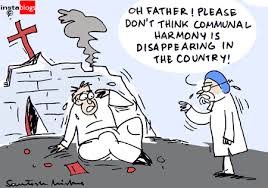 For some time now, a group known as the Catholic-Christian Secular Forum (CSF) has, ironically enough, been a matter of concern for some
Indian Catholics who see themselves as secular. The reasons for this concern
are numerous and this column does not intend to discuss the problems that the
CSF poses; there will be plenty of time for that, especially since the CSF does
not look like it is going away. While flagging the CSF as a concern for Indian
Catholics committed to crafting a secular society in the face of rising
religious extremism in the country, this column will only highlight that one of
the central problems with the CSF lies in the manner in which it seeks to build
up the idea of the Church in India being a persecuted church.
For some time now, a group known as the Catholic-Christian Secular Forum (CSF) has, ironically enough, been a matter of concern for some
Indian Catholics who see themselves as secular. The reasons for this concern
are numerous and this column does not intend to discuss the problems that the
CSF poses; there will be plenty of time for that, especially since the CSF does
not look like it is going away. While flagging the CSF as a concern for Indian
Catholics committed to crafting a secular society in the face of rising
religious extremism in the country, this column will only highlight that one of
the central problems with the CSF lies in the manner in which it seeks to build
up the idea of the Church in India being a persecuted church.
 There can be no doubt that like the Muslim communities in
India, Christians too are being persecuted by segments of both State and
society. However, while this may be a problem, it is not the full picture, and
we need to bear this fact in mind, as we combat, and combat stiffly, this
persecution. The problem with the CSF lies in the fact that, just like segments
of Muslims and Hindus in the country, they seek to create a minority complex
among Christians in India. Nothing can be more detrimental to the creation of a
secular spirit than the creation of a minority complex, since this complex
engenders a siege mentality within the group. Once cultivated sufficiently, we
are unable to see social relations except in terms of ‘us’ versus ‘them’. Every
action is read as being an action of ‘them’ against ‘us’. Most importantly, the
creation of this siege mentality ensures that internal questions of democratic
reform are suffocated to allow the dominant forces within these groups to run
the show without brooking any argument.
There can be no doubt that like the Muslim communities in
India, Christians too are being persecuted by segments of both State and
society. However, while this may be a problem, it is not the full picture, and
we need to bear this fact in mind, as we combat, and combat stiffly, this
persecution. The problem with the CSF lies in the fact that, just like segments
of Muslims and Hindus in the country, they seek to create a minority complex
among Christians in India. Nothing can be more detrimental to the creation of a
secular spirit than the creation of a minority complex, since this complex
engenders a siege mentality within the group. Once cultivated sufficiently, we
are unable to see social relations except in terms of ‘us’ versus ‘them’. Every
action is read as being an action of ‘them’ against ‘us’. Most importantly, the
creation of this siege mentality ensures that internal questions of democratic
reform are suffocated to allow the dominant forces within these groups to run
the show without brooking any argument.
 To this extent then, Fr. Thomas Sequeira, who recently
stepped down as the deputy secretary general of the Catholic Bishops’
Conference of India (CBCI) had it right when he is reported to have said that
Christians in India should not entertain a minority complex. Unfortunately
however, after this sage bit of advice his argument seems to have capsized into
the sea of majoritarianism that constitutes the dominant political thought in
our country today. Fr. Sequeira went on to suggest that while the Christians
should not entertain a minority complex, but they should nevertheless “consider
their minority status as an invitation to join the majority community for the
nation building.”
To this extent then, Fr. Thomas Sequeira, who recently
stepped down as the deputy secretary general of the Catholic Bishops’
Conference of India (CBCI) had it right when he is reported to have said that
Christians in India should not entertain a minority complex. Unfortunately
however, after this sage bit of advice his argument seems to have capsized into
the sea of majoritarianism that constitutes the dominant political thought in
our country today. Fr. Sequeira went on to suggest that while the Christians
should not entertain a minority complex, but they should nevertheless “consider
their minority status as an invitation to join the majority community for the
nation building.”
 Let us exclude for the moment the fact that the word ‘nation’
has a specific history and meaning, and assume that what Fr. Sequeira did in
fact mean, was ‘country-building’. Indeed, in other parts of the interview Fr.
Sequeira uses the word country, in the same context as he earlier used
‘nation’. Even if we exclude this possibility, we are still left with the problematic
equation that Fr. Sequeira has drawn up, one in which the relationship is
between one minority, the Christians, and one majority, the Hindus. Erased
completely from this equation are the other groups outside of Hinduism, such as
the heterogeneous Muslim communities, as well as the minorities within
Hinduism.
Let us exclude for the moment the fact that the word ‘nation’
has a specific history and meaning, and assume that what Fr. Sequeira did in
fact mean, was ‘country-building’. Indeed, in other parts of the interview Fr.
Sequeira uses the word country, in the same context as he earlier used
‘nation’. Even if we exclude this possibility, we are still left with the problematic
equation that Fr. Sequeira has drawn up, one in which the relationship is
between one minority, the Christians, and one majority, the Hindus. Erased
completely from this equation are the other groups outside of Hinduism, such as
the heterogeneous Muslim communities, as well as the minorities within
Hinduism.
This formulation of the equation unfortunately, may not be
the result of a minor error. On the contrary it is reflective of a larger
position within the tendency of the leadership of the Catholic Church in India
to see itself. It sees itself as largely in conversation with the Hindu
majority, the Muslim (and other) groups either falling as a second-rate
priority or none at all. We need merely look at the manner in which Fr.
Sequeira reportedly illustrated the argument he was making. He suggested that
his native state of Goa was a good example to show how people in villages, and
especially in the panchayats, think beyond religious consideration to work
together for the common good, resolving issues of electricity, water and
urbanization. Given the manner in which in a number of cases Muslim communities
in Goa have been targeted by panchayats, it is difficult to believe that Fr.
Sequeira was thinking of the happy interaction between all kinds of Goans, and
not just Catholics and Hindus in happy dialogue.

An interaction with those Catholic religious engaged in
dialogue with Muslim communities in India, will reveal the kind of frustration
that they experience as a result of a failure to find any support from their
religious communities. As it turns out, a good number of Catholics (religious
and lay alike) do in fact see the Muslims as a part of the problem, rather than
as victims of a complex problem. Allow me to suggest that the reasons they may see the Muslims as the problem, is not only because of the upper-caste
positions that the hierarchy and
lay-leaders of the Church often adopt, if not actually being drawn from these
caste locations, but also as a result of the uncritical adoption of Indian
nationalist rhetoric.

One such possible example can be gleaned from the article
reporting Fr. Sequeira’s observations. The article reported that Fr. Sequeira
suggested that Christians have to work to remove the perception among certain
sections of Indians that the Church indulges in conversion works. His
suggestion was that what the Church was in fact engaged in was an attempt “to
strengthen our country.” Fr. Sequeira is not wrong in making this suggestion.
Owing to developments in missiology since the early twentieth century, there
has been a genuine attempt by the Catholic Church to engage not merely in
conversion, but in standing witness to Christ by ameliorating the condition of
those in need of aid. Thus in the words of Pierre Charles S.J., one of the
foundational missiologists of our time “you may entertain the secret hope that
your educational effort may produce religious results, but you should not make
that hope the primary motive of your enterprise...” To do so, Fr. Charles
suggested, would leave the missionary in a morally rather unpleasant position.

This could be what Fr. Sequeira was referring to when he
refers to the work of the Church in India as developmental, and not as
conversion work. However, at the end of the day, we must recognize that the
Church is founded on carrying the faith to others and thus welcomes (after due
diligence and examination) persons into its flock. Thus while the church may be
engaged in strengthening the country, its premise must continue to be hoping
for gains to its cult. To skirt around this issue is to agree to the Indian
nationalist position, built on Hindu minoritarianism, that conversions are
unacceptable, as they pose a threat to nationalism and the majoritarian idea of
the Indian community imagined as ideally Hindu.
 Fr. Sequeira however emphasized that “[R]ecent cases of
Christian persecutions have not discouraged the Church to carry on with its
work among the poor and the deprived” suggesting therefore, that the Church
embraces persecution, rather than shies from it. If such be the case then, it
would behove the CSF and other Christian groups to understand that the persecution
that various minority groups in India are witness to is not reason to retreat
into minoritarianism, but on the contrary a reason to expand into the realms of
the secular, contesting the right of a majority to dictate terms in a
democracy.
Fr. Sequeira however emphasized that “[R]ecent cases of
Christian persecutions have not discouraged the Church to carry on with its
work among the poor and the deprived” suggesting therefore, that the Church
embraces persecution, rather than shies from it. If such be the case then, it
would behove the CSF and other Christian groups to understand that the persecution
that various minority groups in India are witness to is not reason to retreat
into minoritarianism, but on the contrary a reason to expand into the realms of
the secular, contesting the right of a majority to dictate terms in a
democracy.
(A version of this post was first published in the Gomantak Times 20 June 2012)


2 comments:
Very well articulated, Jason. I am deeply engaged with the Muslim political, religious and cultural segments, as also with Sikhs, Buddhists and Dalits. i know know frustrating it is to expect support from the hierarchy.
Can we use your blog in some indian magazines? do send me sa word file. god bless
Very well articulated, Jason. I work with India's other minorities, including Muslims and Dalits. I know how frustrating it is to get the Hierarchy interested, much less involved.
I would like to use this piece in some magazine. do send me a word file, and your permission
Post a Comment